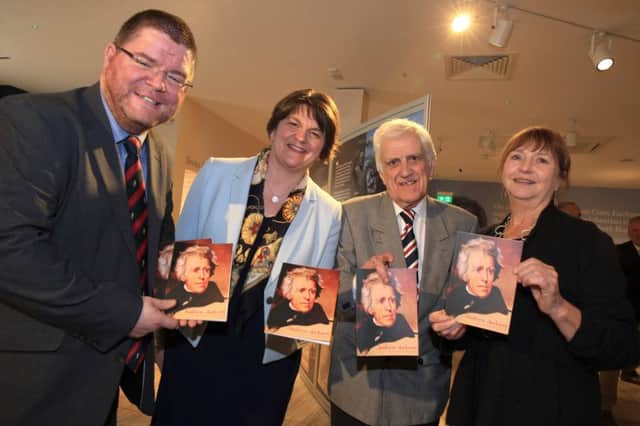Brochure celebrates life of Andrew Jackson, first Ulster-Scots American president


Jackson, son of Carrickfergus parents Andrew and Elizabeth Jackson who emigrated to America in 1765, was, in a highly distinguished career, commander as ‘Old Hickory’ of the US army, and president over two terms (1828-36).
An illustrated 50-page brochure, charting the heroic exploits of Jackson, was launched by the Ulster-Scots Agency at a reception for a delegation of public representatives, academics and educationalists from Nashville as part of the Sister-Cities’ twinning linking Belfast and the Tennessee capital.
Advertisement
Hide AdAdvertisement
Hide AdDUP leader and former first minister Arlene Foster, Nashville Metropolitan councillor-at-large Jim Shulman and other guests were welcomed by Ian Crozier, chief executive of the Ulster-Scots Agency.
Mr Crozier said Andrew Jackson was a 19th century American luminary whose profile as a statesman, politican and soldier was tangibly recognised in the Ulster homeland of his Co Antrim-born parents and, particularly, in Tennessee where he lived for most of his life.
The Jackson brochure was written and compiled, on behalf of the Ulster-Scots Agency, by former senior News Letter journalist Billy Kennedy, author of 11 books on 18th century Ulster migration to America.
In the brochure, he quotes another US president Theodore Roosevelt, who said Andrew Jackson had many faults, but, with the exception of George Washington and Abraham Lincoln, “no man has left a deeper mark on American history”.
Advertisement
Hide AdAdvertisement
Hide AdMr Kennedy recounts that Jackson, born in the Waxhaws, Carolinas region 20 months after his parents moved from Ulster, had an American patriot militia role as a teenager in the 1770s Revolutionary War and, later, as commander of the US army, defeated British forces in the epic Battle of New Orleans on January 18, 1815.
He became a politican in Nashville and founded the Democratic Party, espousing Jacksonian democracy – “government for the people, by the people”. He was the seventh, and the first “common man” to be elected president. His connection to Nashville, living with his wife Rachel at ‘The Hermitage’ estate, remained until his death in 1845, aged 78.